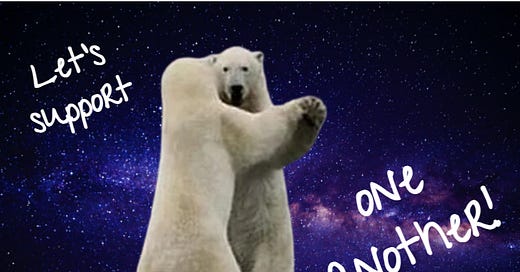Q: What's on your mind regarding literary magazines?
"So, here it is. Open thread!"
Welcome to our weekend conversation!
Dear ones, I hope you are all doing well amidst the turbulence of the past week.
On the literary front, I saw a lot of lit mags and writers announcing their departure from X. At the same time, many writers choosing to stay on the platform were reaching out, looking for ways to maintain the online connections and community they’ve built over time.
This weekend’s conversation is not about X, though. It is about finding support for your work and perhaps building community in new spaces.
Over the summer we had an open discussion thread. This was a space where you all posted your questions and helped one another find solutions and resources. I loved seeing all of you step in to share your knowledge, provide info, commiserate and ask questions. I suggested this could be a regular feature of this site, and many of you liked that idea.
I thought now would be a good time to offer that space again.
So, here it is. Open thread!
What’s on your mind regarding literary magazines?
Do you have any questions you haven’t yet found answers to?
Is there a specific lit-mag-related situation that’s got you scratching your head?
Are you wondering about certain magazines?
Are you one of the people searching for a new literary community? Or do you want to tell us about the great one you’ve already found?
What’s on your lit-magical mind?





I am optimistic. Let's start with the problem. In the past, a great number of literary publications came across as MFA exercises in minimalism about some white middle class scholar going through a middle age crisis. My girlfriend would see me with all this copies and asked if she could read some. Several months later I asked what she thought and she said that she stopped reading. Why? Too boring. Too petulant. That scholastic arrogance came across loud and clear when they rejected some of my stories indicating that my story was "too cinematic." I felt discouraged. Then I began to see a shift. Stories in lit mags, began to be more international. They began to cover other narratives. Not only that, but some began to include hybrids, graphic stories, and speculative fiction. Take for instance The North American Review. It's absolutely gorgeous, with art and graphics everywhere. To pass a page feels like eating your favorite dessert. Many of the online magazines have done the same. They are more open to the possibilities. It's like they have re-discovered that concept of STORY instead of vignettes about character. So I see a more positive future. But I also feel they haven't done enough. I think they need to be more inclusive of the general public, not just writing for other writers. They need to learn to promote more. Maybe ask public libraries to have a Lit Mag section (which I discovered that many public libraries do not have). I believe, lit mags are about to explode into a renaissance, where an older population, exhausted and annoyed by traditional entertainment, want something more substantive. And while the market is in flux, and many mags simply cannot stay afloat, others will evolve and if anything find and economic model that will allow them to if anything keep publishing exciting new works. Hail to the lit mag. Hip hip, hurray.
Here’s how I feel about lit mag submission right now. 1) Simultaneous submissions should be assumed, understood, and perhaps even encouraged. I find disallowing simultaneous submissions disrespectful to writers and outdated/regressive. 2) There should be a maximum response time (12 weeks? 6 months?) beyond which we can deem a lit mag disrespectful of writers/anti-writer. 3) “Ghosting” rejections should be unacceptable. Respect authors enough to communicate a decision. 4) Editors need to stop virtue signaling their supposed desire to uplift BIPOC, women, & marginalized/underrepresented voices if they’re going to put keep putting out issues loaded with dominant-identity authors or works. I’ve seen a lit mag state the intention for inclusivity, then publish a wall of author headshots for their subsequent issue that was almost entirely white and largely male. Just say you’re going to publish the writing you like best regardless of identity then. That would be less disingenuous. 5) Editors need to stop writing patronizing/condescending things in rejections like, “Keep writing!” Why wouldn’t we?